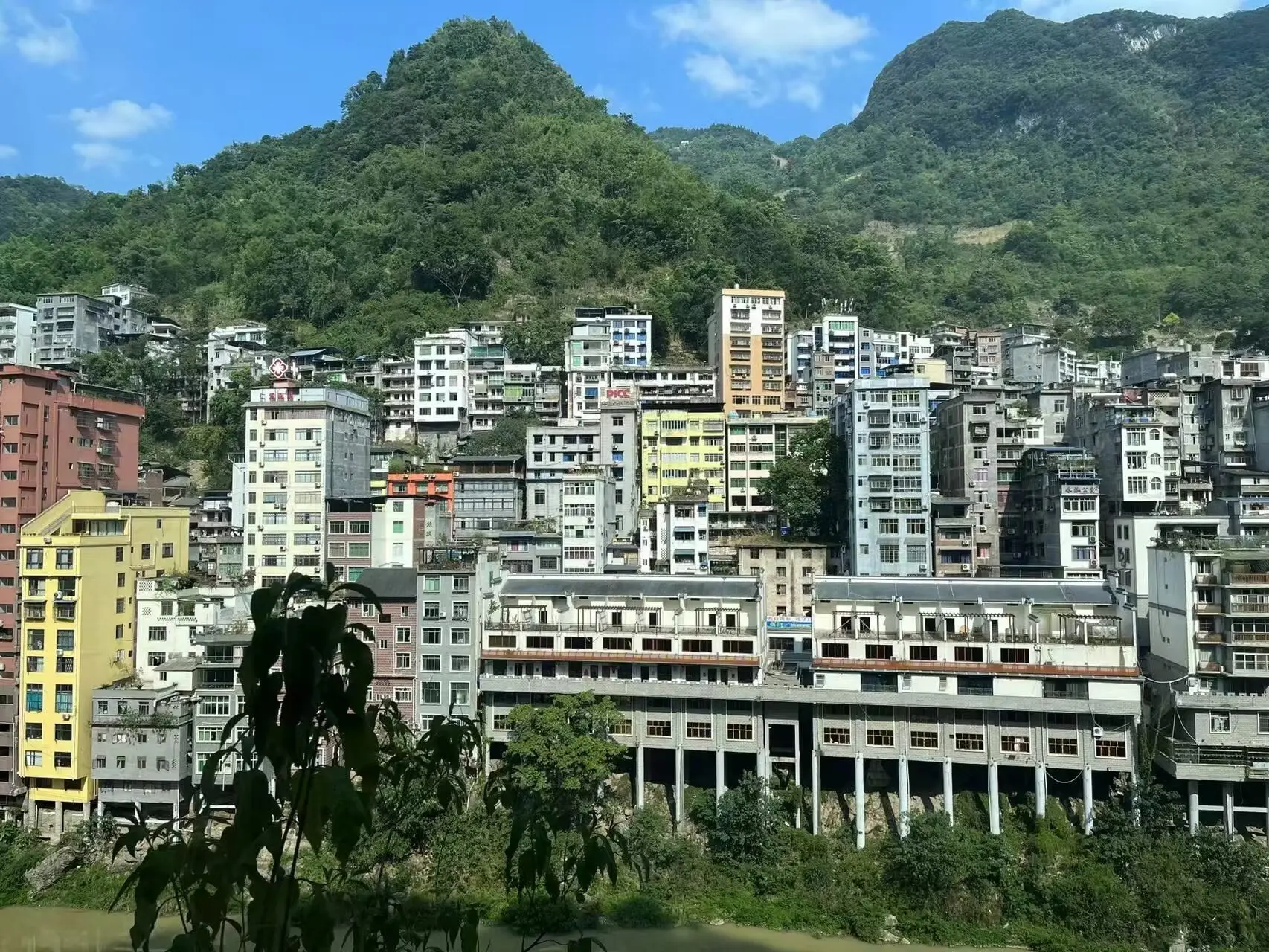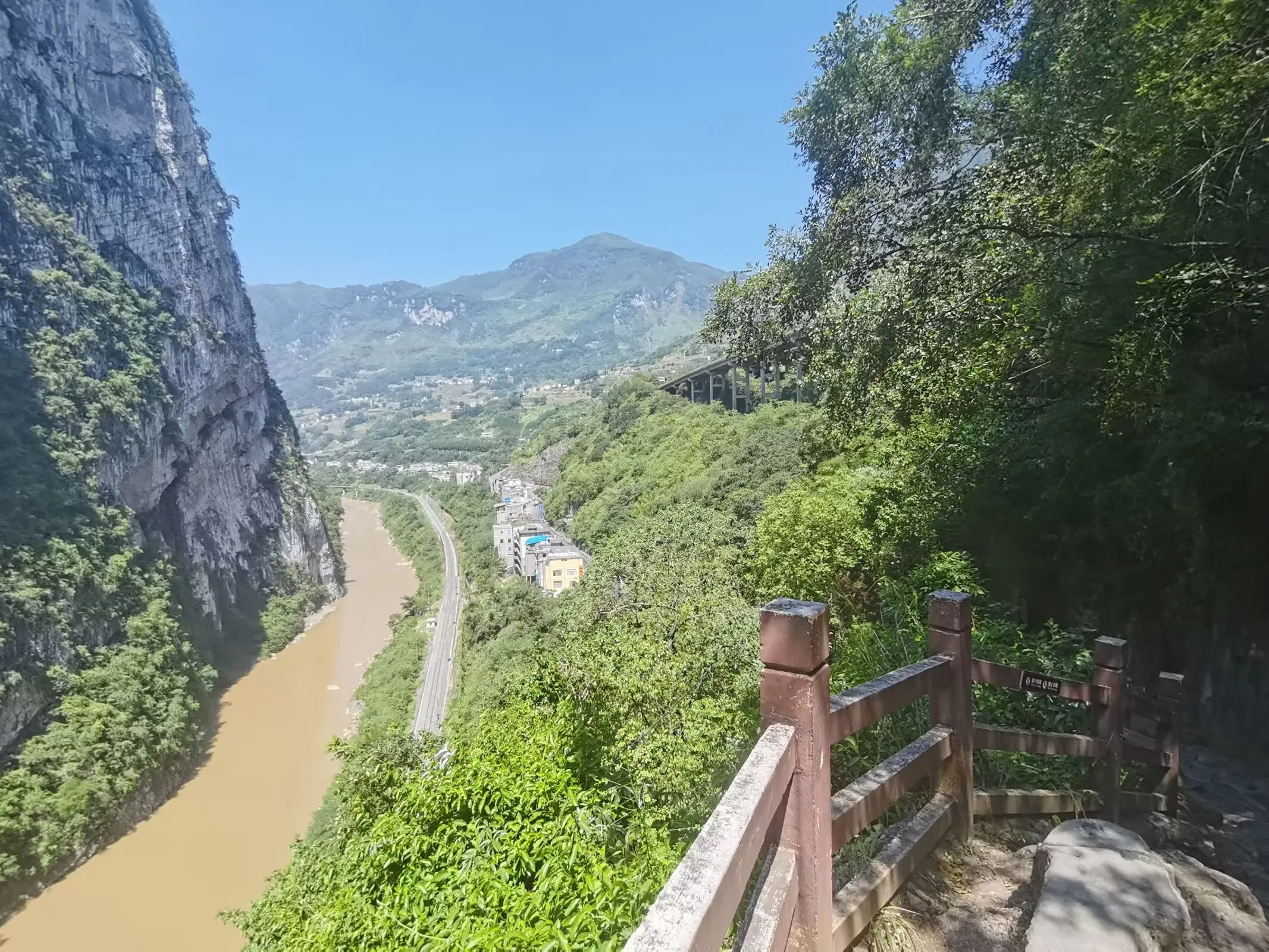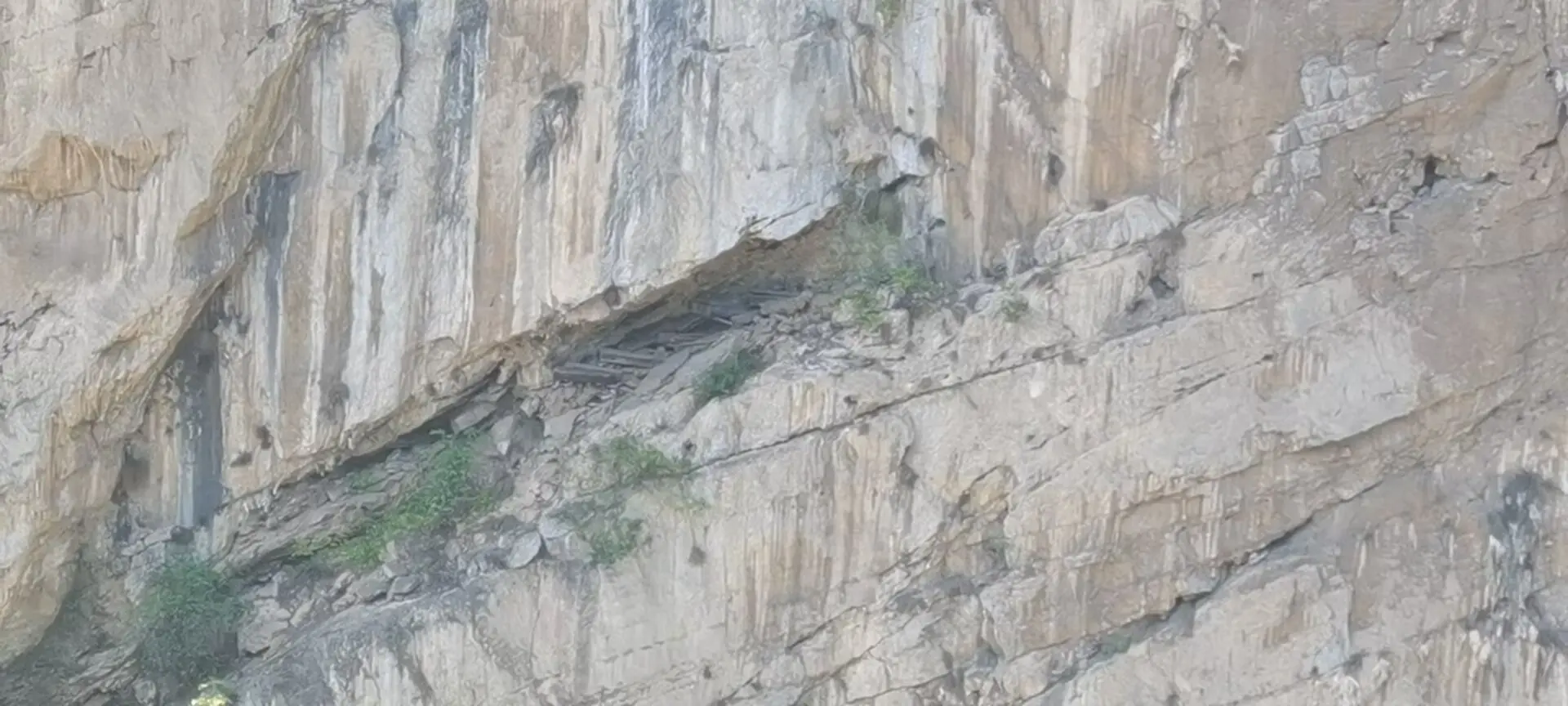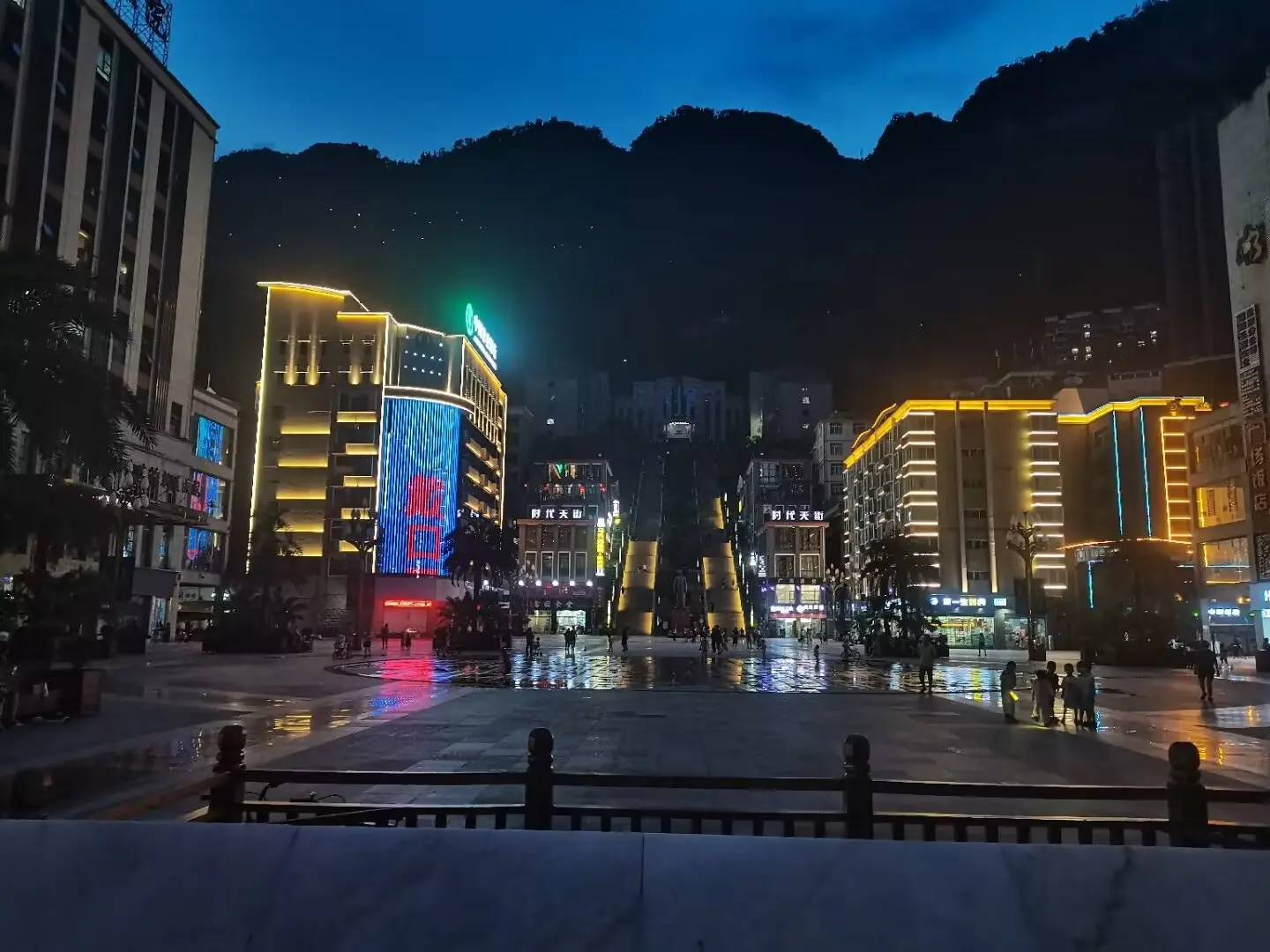Research Note 1: Zhaotong, Yunnan

During the holiday, I accompanied my teachers to conduct research at several county-level poverty alleviation and relocation sites in Zhaotong, Yunnan.
Zhaotong is a city located at the junction of Sichuan and Yunnan provinces, famous for its Zhaotong apples. In the past, Zhaotong was renowned for its bold and vigorous people, but now, with a strong emphasis on education, the situation has improved significantly. The rural revitalization efforts here focus on supporting the special industry of Gastrodia elata.
County Town Scenic Spot
Yanjin
Yanjin in Yunnan is known as a “front-line city,” with its main body built along the river. The roads are narrow, leaving only a single main road passing through the city. To accommodate this barely passable dual-carriageway, residents have had to extend their houses and plots along the riverbank slopes, resulting in houses predominantly made of reinforced concrete. The entire old town area is like LEGO blocks inserted between the two sides of the river. Often, just one family will occupy an entire building. Due to this terrain, the river here is swift-flowing, leading to relatively frequent flooding each year.

The mountainous terrain in Yunnan is diverse, and there are many types of mushrooms, most of which are poisonous. Therefore, the community places particular emphasis on safety education to prevent both water disasters and food poisoning. As a precautionary measure, the community has even signed agreements with residents regarding food poisoning caused by mushrooms, stipulating that individuals bear responsibility for the consequences.
Tea Horse Ancient Road
The Tea Horse Ancient Road is home to the famous “Dousha Pass” and the cliff burials of the “Bo People Hanging Coffins”.
During the Tang Dynasty, emissaries were sent to administer Yunnan, and the cliff carvings here serve as important evidence. Thanks to its strategic location as a transportation hub for the province, despite having the narrowest roads in some areas, it was the first to connect to the Southwest Silk Road, subway, train, and expressway. The scenic spot here is known as “One View and Five Roads”.


Other County Towns
Other county towns have relatively fewer attractions, so I won’t mention them in detail. Yunnan’s terrain is mainly mountainous and hilly, which makes road construction more costly and tolls on expressways higher. Due to the limited availability of land caused by the terrain, urban planning in Yunnan faces many constraints, and construction costs are also higher.
Take Ludian County as an example, where most residents live in the mountains. In the evening, walking up the road along the mountain, you can see scattered lights in the distance on the mountain, like stars in the night sky. Therefore, the local area also calls the relocation operation as a “picking star action.”
Research Summary
Research Summary
The relocation targets residents in remote mountainous areas, affected by environmental and economic factors, and generally suffering from chronic diseases. What needs to change is not just their physical living environment, but also their consciousness.
The key to relocation is how to help relocated households adapt to the transformation of identity and consciousness from rural to urban towns. In rural areas, they were self-sufficient, without water and electricity bills, growing their own vegetables. Now, they face property management fees, water and electricity bills, which they may not fully understand. Therefore, the community has adopted a transitional plan: water and electricity are free for the first three years, with gradually increasing payment proportions thereafter. To adapt to rural culture, the community also provides services for both happy and sad occasions. All can be handled within the community.
Implementing grid management (a classic special term 🙃), establishing files, and finely managing in batches. Classify those with disabilities, those without disabilities, those with major illnesses, and elderly families… Regular training is needed to help residents adapt to the internet, at least to learn to read WeChat notifications.
Multi-dimensional poverty alleviation employment, preventing relapse into poverty. Employment subsidies for working outside, poverty alleviation employment workshops within the community, local industry poverty alleviation employment, and entrepreneurial subsidies (opening a stall, buying snacks is also considered entrepreneurship).
Leveraging comparative advantages. Yunnan’s advantage in developing industries is green food—such as Gastrodia elata, bamboo shoots, oranges, and others. Its weaknesses lie in transportation, and processing and manufacturing capabilities.
The local area lacks money, really lacks money! There are many arrears in project payments.
Research Banquets
During county-level research, it’s inevitable to interface with local leaders, and these interactions often involve banquets where baijiu (a strong Chinese liquor) is typically served. Excessive drinking is always harmful to health. Here are some personal insights based on my experiences.
The banquets I encountered in several counties generally followed four stages:
- Stage One: Personal introductions, after which individuals start drinking voluntarily.
- Stage Two: Mutual exchanges and inviting others to drink, one-on-one.
- Stage Three: Speech by leaders, giving collective advice, followed by a group toast where everyone stands and toasts around the table.
- Stage Four: As the banquet wraps up, exchanging WeChat contacts.
Strategies for drinking should be flexible and adapted according to each stage.
Spell casting preparation: Emphasize repeatedly that you don’t drink, haven’t drunk before, to reduce the difficulty level as much as possible.
-
Stage One: Usually, when standing up to introduce yourself, you can start pouring a bit of the drink from the small or medium-sized glass. Alternatively, you can discreetly pour it out under the table beforehand. When raising the glass, use your hand to cover the side of the glass (fully covering the glass would look too fake!), so that others can’t see the level of the drink, thinking it’s in the pouring state.
-
Stage Two: Because it’s a university student survey, you can eat and drink casually without knowing the rules. Pay attention to see if there’s milk or tea cups on the table. Drink water to one-third full, hold the wine in your mouth after the toast (be careful not to puff your mouth up! Tongue might be quite rough), pretend to drink the beverage, and spill the wine into the beverage. If no beverage is available, the filled bowl of rice or soup is the best hiding tool
When others interject to add to the conversation, it’s also a good opportunity for a small move. Typically, at a drinking session, everyone usually watches the person speaking.
- Stage three: At this point, the meal is almost over and most people are at least tipsy, so they can rest assured. When toasting, cover the sides of the glass with your hands. Join the toasting group and pretend to be drinking, but no wine enters your mouth. Move around a lot. At this time, everyone is usually trying to please others and will usually not notice small movements.
It is recommended to use the teachings in Liu Qian’s magic class - big movements cover up small movements to mislead the other party’s attention. For example, one hand makes movements to attract attention, and the other hand gently pours wine on the ground.

